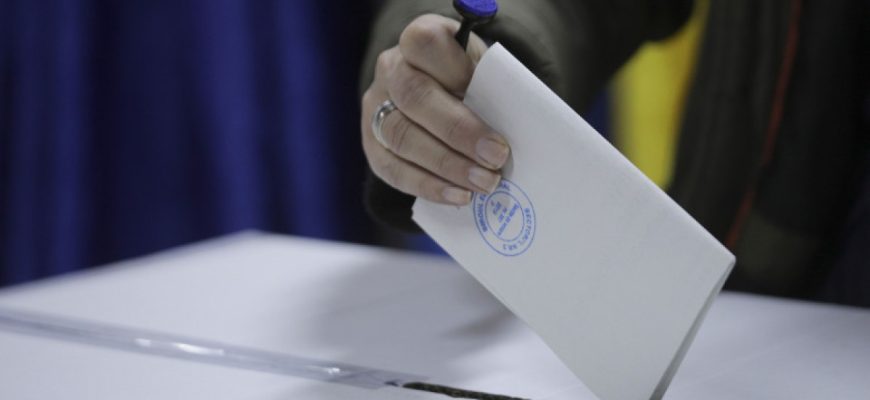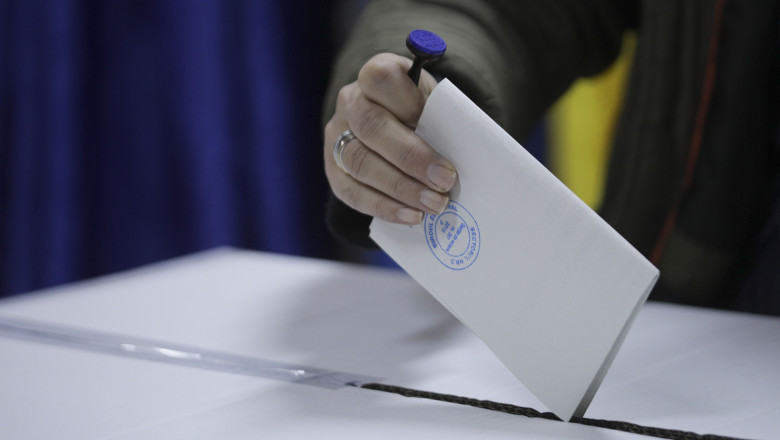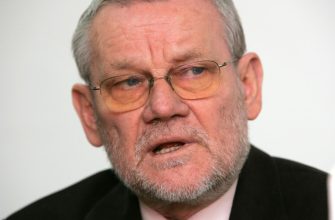Romania registered the second largest increase in voting intention in this year’s European elections compared to 2019, after the Czech Republic, reaching 74%, which represents no less than 19 percentage points more than the election five years ago, according to the latest Eurobarometer survey published on Wednesday. However, Romania is not in the first third of the EU states in terms of the proportion of the intention to vote in the European elections from June 6-9.
Asked if they would vote in the European elections under the conditions in which voting would take place next week, 74% of Romanians said they would probably vote (compared to 71% at the EU level ). At the opposite pole, 6% say they would probably not vote (compared to 14% in the EU), and their proportion has fallen by 14 percentage points since the February/March 2019 Eurobarometer, so from before the previous European elections.
This increase in voting intention is lower only than that of the Czech Republic, which increased by 28 percentage points between 2019 and 2024, from 30% to 58%. However, Denmark (87%), the Netherlands (86%) and Sweden (81%) are in the first places in terms of the level of voting intention.
At the general level of the EU, the average increase in voting intention is ten percentage points compared to the last barometer before the previous election.
Romanians have a positive image of the European Parliament
Regarding the interest in the EU elections, in Romania it is similar to the average in the community block, being evaluated by the last Eurobarometer at 60%, an increase of 11 percentage points compared to the autumn last year.
Romanians continue to have a totally positive image of the European Parliament in the proportion of 46%, the same as last fall, although the percentage of those who have a totally negative image increased by 7 percentage points, not at 19%. At the EU level, the total positive perception is on average 41%, and the total negative 18%.
Fifty-three percent of Romanians would like the European Parliament to play a more important role in the future (56% in the EU), and 37% would like the institution, on the contrary, to play a more slightly important (compared to 28% in the EU).
In total, 20% of Romanians know exactly when the European elections will take place in their country, above the EU average of 14%, while 12% know only the month and the year, of the EU average of 15%. The percentage of those who only know the year in which the EP elections will take place is 48 in Romania and 38 in the EU.
Fifty-four percent of Romanians say that for them personally it is important to vote in the European elections (53% in the EU), 40% say that voting has an average importance for them (36% EU average ), while 5% state that the election has a low importance for them (10% in the EU).
More important for Romanians is the vote in the national elections, which 63% say is of high importance (69% in the EU), 33% that it is of medium importance (25% in EU), and 3% that it is of low importance (5% in the EU).
Romanians consider that the main themes that should be discussed in the electoral campaign for the EU elections are support for the economy and for the creation of new jobs (42%), public health (37%), respectively the fight against poverty and social exclusion (33%), themes that are in the first three places and at the top of priorities at the EU-27 level, but in reverse order.
What expectations do Romanians have from the European Parliament
When asked what values the European Parliament should defend as a priority in the next five years, Romanians ranked first democracy (39%), respect for national identities, culture and traditions In the member states (26%), respectively solidarity between EU member states and between its regions (24%).
A proportion of 68% of Romanians consider that voting in the European elections is even more important in the current European context, compared to 81% at the level of the entire EU.
At the level of voting behavior, there is no difference between Romanians and other Europeans, 58% of them stating that they always vote, regardless of whether it is local, national or European elections. 32% of them said that they vote often (identical to the EU average), and 5% that they never vote (compared to 9% in the EU).
The standard of living of the Romanians
Asked how their standard of living has evolved in the last five years, 46% of Romanians said that it has decreased (45% in the EU), 46% that it has not changed (49% EU average) and 7% that it increased (only 6% in the EU). At the same time, 51% of Romanians said that they occasionally had problems paying bills at the end of the month (compared to 29% EU average), and 8% that they have problems most of the time for this reason (compared to 7% in the EU).
No less than 45% of Romanians believe that things are heading in the right direction in the EU, far above the European average (32%), while 41% support that things are heading in the wrong direction, given the EU average of 49%.
On the other hand, only 34% of Romanians (an increase of five percentage points compared to September/October 2023) answered affirmatively to the question if “currently, you consider that, in generally, are things going in the right direction in your country?”, compared to a European average of 27%, while 57% said things are going In a wrong direction, in the context where the EU average is 60%.
At the same time, 63% of Romanians believe that their personal life is heading in the right direction (69% at the EU level), with a 12 percentage point increase compared to of the previous Eurobarometer, and 27% gave a contrary answer (19% EU average), down by 9 percentage points. The Romanian citizens most satisfied with the direction in which their personal life is heading are those in the 25-39 age groups (73%) and 40- 54 years (66%).
59% of Romanians, dissatisfied with democracy in the country
The majority of Romanians (59%) are totally dissatisfied with the way democracy works in their country, compared to 42% of the EU average, and 39% above that they are totally satisfied (56% EU average). Regarding the way democracy works in the EU, 50% of Romanians declare themselves totally satisfied (down 6 pp compared to September/October 2023 ), and 45% totally dissatisfied (up by 7 pp), compared to 52% and 42% EU average respectively.
At the same time, the majority of Romanians chose the option “totally disagree” when they were asked to comment on the statements “my voice matters in the EU” (56% in Romania, vs. 48% of the EU average), respectively “my voice counts in my country” (52% in Romania, compared to 37% of the EU average). On the other hand, 53% of Romanians believe that their country’s voice matters in the EU (versus 67% EU average), while 42% have the opposite opinion (29% EU average ).
Romanians are more optimistic than the EU average that their standard of living will increase in the next five years (17% compared to 15%), respectively less pessimistic that their standard of living will decrease in in this period (30% against 32%). The percentage of those who believe that their standard of living will remain unchanged in the next five years is almost similar in Romania and in the EU (48% and 49%, respectively).
Romanians remain optimistic
Also, Romanians are more optimistic than other Europeans about the increase in their standard of living in the next year, 23% stating that it will be better for them, 43% the same and 31% worse, compared to the EU average of 14%, 51% and 32% respectively. However, this optimism regarding the standard of living in the short term is the highest in the age groups 15-24 years (44%) and 25-39 years (30%) and decreases progressively with age rest.
Romanians are more optimistic than the EU average that the state of their country’s economy will be better in a year (21% compared to 14% in the EU), but they are at the same level as in terms of trust in the future of the EU. Sixty-one percent of Romanians are totally optimistic about the future of the EU, and 35% are totally pessimistic.
However, the proportion of Romanians who follow what is happening in EU politics is only 52% (compared to the EU average of 60%), but it is increasing by two percentage points compared to the previous Eurobarometer last fall. The age categories most interested in EU policy are 25-39 years (55%) and respectively over 55 years (52%).
Regarding the impact of EU actions on their daily life, 13% of Romanians said that it is very high (20% in the EU), 52% estimated that it exists between some measure (53% in the EU), 26% said it is not too high (20% in the EU), and 7% said it does not exist (compared to 6% in the EU ).
A proportion of 50% of Romanians say that the image they have of the EU is totally positive (47% EU average), 33% say that the image they have is neutral (36% in the EU), While 16% have a totally negative image of the EU (17% in the EU).
However, only 45% of Romanians believe that their country’s membership of the EU is a good thing, down by six percentage points compared to last autumn, and 20% believe that it is a bad thing, substantially different proportions compared to the EU average, where 60% of Europeans share favorable opinions and 12% negative ones.
On the other hand, 59% of Romanians say that for them the country’s membership in the EU is important, compared to 65% at the EU level, 29% are neutral (22% in the EU), and 11% say that the country’s membership in the EU is not important (12% in the EU).
The proportion of Romanians who believe that their country has benefited from joining the EU is even higher, 65% (down by 4 pp compared to the previous Eurobarometer), although lower than the EU average (71%), and 30% of Romanians say that their country did not benefit from accession (compared to the EU average of 23%).
How does the EU deal with crises
Asked how satisfied they are with the way in which the EU has responded to a series of crises, Romanians declared themselves totally satisfied in proportion to 46% the response to climate change, 39% (economic and financial situation), 39% (Russia’s invasion of Ukraine), 39% (migration) and 36% (Brexit). The answers to the EU crisis situations with which Romanians are totally dissatisfied concerned the COVID-19 pandemic (60%), the economic and financial situation (58%), the Russian invasion of n Ukraine and migration (56% each).
Currently, 35% of Romanians believe that the role of the EU in the world has become more important in recent years (40% EU average), while 35% say that it has remained the same (identical to EU) and 27% say it is less important (22% in the EU).
Regarding the areas of interest for strengthening its position in the world, at the EU level, the first positions are defense and security (37%), energy independence, resources and infrastructures (30%) and respectively food security and agriculture (30%). Romanians consider that the main areas of interest for strengthening the EU’s position in the world must be defense and security (33%), food security and agriculture (31%), respectively competitiveness, economy and industry (29%).
Romanians also differ from other EU citizens in terms of their opinions about four important non-EU states. Thus, 45% of Romanians have a totally positive opinion towards China (compared to only 24% at EU level), 18% towards Russia (12% EU average) and 61% towards by the USA (48% in the EU). The difference in favorable perception is the largest in the case of Turkey, towards which 55% of Romanians have a totally positive opinion, compared to 26% in the EU.
The Eurobarometer survey was conducted between February 7 and March 7, 2024, through face-to-face interviews, on a sample of 26,411 people at EU level and 1,046 in Romania, in The number of the population over 15 years.
Publisher: IC









